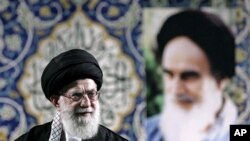ANKARA —
Iran's Supreme Leader Ayatollah Ali Khamenei said on Thursday that nuclear negotiations with world powers had revealed U.S. “enmity” towards the Islamic state.
He was speaking hours before the resumption of talks in Geneva.
“We had announced previously that on certain issues, if we feel it is expedient, we would negotiate with the Satan [the United States] to deter its evil,” Khamenei told a gathering, reported by the official IRNA news agency.
“The nuclear talks showed the enmity of America against Iran, Iranians, Islam and Muslims,” he said.
Iran and the European Union will hold talks in Geneva on Thursday to discuss the practical details of implementing a nuclear agreement reached in Geneva in November. U.S. Undersecretary of State for Political Affairs Wendy Sherman is also due to take part.
The Geneva deal was designed to halt Iran's nuclear advances for six months to buy time for negotiations on a final settlement. Scope for diplomacy widened after Iran elected the pragmatic Hassan Rouhani as president in June. He had promised to reduce Tehran's isolation and win an easing of sanctions.
Under the accord, Iran will curb its atomic activities, which the West suspects are aimed at acquiring a nuclear bomb capability, in return for some easing of the international sanctions that have battered the oil producer's economy. Iran says its nuclear work is entirely peaceful.
He was speaking hours before the resumption of talks in Geneva.
“We had announced previously that on certain issues, if we feel it is expedient, we would negotiate with the Satan [the United States] to deter its evil,” Khamenei told a gathering, reported by the official IRNA news agency.
“The nuclear talks showed the enmity of America against Iran, Iranians, Islam and Muslims,” he said.
Iran and the European Union will hold talks in Geneva on Thursday to discuss the practical details of implementing a nuclear agreement reached in Geneva in November. U.S. Undersecretary of State for Political Affairs Wendy Sherman is also due to take part.
The Geneva deal was designed to halt Iran's nuclear advances for six months to buy time for negotiations on a final settlement. Scope for diplomacy widened after Iran elected the pragmatic Hassan Rouhani as president in June. He had promised to reduce Tehran's isolation and win an easing of sanctions.
Under the accord, Iran will curb its atomic activities, which the West suspects are aimed at acquiring a nuclear bomb capability, in return for some easing of the international sanctions that have battered the oil producer's economy. Iran says its nuclear work is entirely peaceful.









